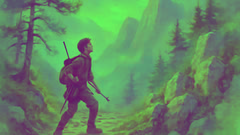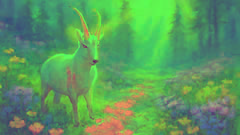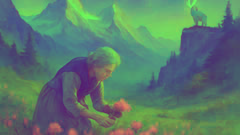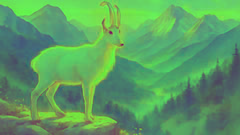Introduction
Beneath the vast and ever-changing skies of Slovenia, where clouds drift across jagged mountain crests like flocks of silver sheep, the Julian Alps rise in all their wild glory. Crags of ancient limestone tower above emerald valleys, their sheer faces adorned with the last snows of spring and the vibrant tapestries of alpine wildflowers. Echoes of distant waterfalls mingle with the sharp whistle of marmots and the haunting calls of choughs, their wings casting fleeting shadows over mossy stones. For centuries, shepherds, hunters, and wanderers have trod these hidden trails, hearts full of wonder and respect for the land’s untamed spirit. Yet, in all these ages, few have glimpsed the true soul of the mountains: Zlatorog, the Goldhorn—a creature both feared and revered, whose legend is woven into every breeze and rivulet.
It is said that Zlatorog is no ordinary animal, but a chamois as white as the driven snow, with horns of pure, radiant gold. His hooves touch the rocky ledges with the lightness of mist, and his eyes hold the wisdom of millennia. In the golden dawns and violet dusks, those lucky—or perhaps fated—enough to spy him speak of an otherworldly glow shimmering in the air, as though the mountains themselves bend to his silent passage. Where he leaps, rare flowers bloom, and where his horns graze, legends say, the earth hides treasures beyond human imagining. But these riches are not simply gold and jewels. They are the mysteries of life itself: the harmony of nature, the resilience of the wild, and the courage it takes to resist greed and despair.
The legend of Zlatorog has been whispered from fireside to fireside, embroidered into folk songs, and painted onto pottery passed down through generations. It is a story born of longing and loss, of bravery and the tragic cost of human desire. It begins in an age when the world was young, and the mountains were watched over by ancient spirits—an age when love, loyalty, and the lure of forbidden riches shaped destinies for good and ill. So listen now, as the wind carries us high into the Julian Alps, to a time when the Goldhorn still roamed the summits and the fate of a whole valley hung by a thread of golden light.
Whispers Among the Peaks
Long before the first church bells echoed through the valleys, Triglav’s shadow ruled the land, and the rivers Sava and Soca were unspoiled as morning dew. In these times, the mountain folk lived by the rhythm of sun and storm, their lives entwined with the whims of the land. Herds grazed in meadows bright with gentian and edelweiss, and the old ones told stories as ancient as the roots of the forest. Of all their tales, none was more treasured than that of Zlatorog—the Goldhorn—who watched over the hidden riches of the mountains.

The legend began not in thunder or fire, but in silence. High on the plateau, where only the bravest dared climb, lay a garden of impossible beauty: the Garden of Eden. It was said to be a place where every rare flower bloomed, watered by crystalline springs and shielded by towering pines. No human hand had ever touched its soil, for it was guarded by Zlatorog himself. The chamois’s white coat gleamed like the first snow, and his golden horns were said to hold the power of life itself. Some called him a spirit, others an angel sent by the goddess of the mountains. But all agreed: to see Zlatorog was a blessing—and a warning.
Among those who heard the tales was a young hunter from the village of Trenta, whose life was marked by both joy and hardship. His name was Luka, and his heart beat with the wildness of the hills. Orphaned as a boy, Luka found solace in the forests and cliffs that surrounded his home, learning to read the signs of deer, the paths of foxes, and the secret language of birds. He grew strong and keen-eyed, his spirit shaped by the mountains’ lessons: patience, humility, and the understanding that nature gives and takes in equal measure.
One spring, as the snow melted from the high ridges, Luka fell in love with a girl from a neighboring valley. Her name was Marija, and her laughter rang out like silver bells. She wore wildflowers in her hair and walked barefoot through mountain streams. For a time, their love seemed destined to last as long as the hills themselves. But life in the valleys was harsh, and Marija’s father, a proud man embittered by years of poor harvests, wished for a better match for his daughter—a suitor with wealth enough to ease their burdens.
Word spread that Marija’s hand would go to the man who could offer the richest bride price. Luka’s heart was pierced with sorrow, for all he could give was a hunting knife and his own steadfast love. He wandered the heights, his soul restless as the mountain winds. It was then that Luka first heard the whispers: stories of Zlatorog’s hidden treasure, buried deep in a cave beneath the White Peaks. Some claimed it was guarded by fire-breathing dragons; others that it was cursed by the mountain spirits. But always, Zlatorog was at its heart—eternal, elusive, and dangerous to pursue.
Still, the longing in Luka’s heart grew sharper than hunger. He dreamed of golden horns flashing in starlight and piles of treasure that would win Marija’s hand forever. One bitter morning, with frost lacing every blade of grass, he set out to find Zlatorog and claim his fabled hoard, unaware that the mountains listen to every wish—and sometimes answer in their own fierce way.
The Golden Horns and the Secret Garden
Luka’s journey was both a test of endurance and of spirit. The Julian Alps, beautiful yet unyielding, greeted him with sharp winds and sudden storms. He climbed higher than he’d ever dared before, following trails known only to chamois and eagles. For days he wandered, living on handfuls of berries and icy water from mountain springs. Each night he camped beneath cold stars, haunted by dreams of golden horns glimmering just beyond reach.

On the third morning, after a night of restless sleep on a bed of pine needles, Luka awoke to a strange stillness. The usual chorus of birds was silent; the wind itself seemed to hold its breath. He rose quietly, listening. That was when he heard it—a soft, musical clatter of hooves on stone, like the tinkle of crystal bells. Luka crept through a stand of stunted larches, heart pounding. And there, poised on a ledge above a field of dazzling white edelweiss, stood Zlatorog.
The creature was more magnificent than any story could have prepared him for. His coat was snow-pure, almost luminous in the dawn light, and his golden horns curved skyward like sunbeams caught in solid form. Zlatorog turned his head, eyes meeting Luka’s with a gaze both ancient and impossibly sad. For a long moment, time stood still. Then, as if he’d been waiting for this encounter all along, Zlatorog bounded away with impossible speed, vanishing into a hidden ravine.
Luka scrambled after him, heedless of danger, driven by hope and desperation. He slipped, bruised, and clawed his way up rocky inclines until he reached a place that seemed carved from dreams—the fabled Garden of Eden. Wildflowers of every imaginable color swayed in silent harmony, and rare herbs released their fragrance into the crisp air. In the center stood Zlatorog, majestic and calm, beside a spring whose waters sparkled with golden flecks. The chamois lowered his head to drink, and for a moment Luka hesitated, overwhelmed by awe and an unshakable sense that he was trespassing on sacred ground.
But love—and longing—can cloud even the purest heart. As Zlatorog lifted his head, Luka drew the silver bullet he’d brought for this very moment. The bullet had been forged by a mysterious stranger in the valley, said to pierce even the hides of spirits. Luka’s hand shook as he took aim. In his mind’s eye, he saw Marija’s gentle smile, her father’s stern gaze, the endless struggle of poverty. With a desperate prayer, he fired.
The bullet struck true. Zlatorog stumbled and blood—pure as melted snow—fell upon the earth. Where it touched, the grass withered, then bloomed anew with dazzling crimson flowers never seen before. The chamois staggered toward a cliff’s edge. Luka, heart racing, rushed forward to claim his prize, but Zlatorog turned his golden horns toward the wounded earth. Miraculously, flowers sprang up beneath his feet, trailing a living path of healing across the stones. With his last ounce of strength, Zlatorog leaped into the void—and from his horns, a blinding light erupted, illuminating a hidden cavern in the cliff wall.
Inside that cavern, Luka glimpsed piles of gold and gems beyond all reckoning. The treasure gleamed in the unnatural light, beckoning him closer. But as he stepped across the threshold, a terrible rumbling shook the mountain. The stones themselves seemed to cry out in anguish. Suddenly, the earth split beneath his feet. Luka tried to flee, but the ground gave way, swallowing him into darkness. As he fell, he heard the mournful cry of Zlatorog echo across the peaks—a warning, a curse, and a benediction all at once.
Echoes in the Valley
The mountain’s fury echoed for days. Rockslides thundered down into the valleys, and the villagers whispered that the old gods had awakened in anger. When at last the earth stilled, Luka was gone—vanished without a trace. Only Marija knew the truth, for Luka had confessed his plan to her in a final letter. She wept for her lost love and for the innocence shattered by greed. From that day forward, the once-verdant meadows where Luka had played as a child grew wild and strange. Crimson flowers—the Zlatorog’s legacy—appeared where none had ever grown before, their petals bright as spilled wine against the green.

Marija returned often to those lonely fields, feeling the weight of her own sorrow and guilt. The villagers, too, felt the change. The air seemed heavier; storms came more often, their thunder rolling like distant drums. Yet amid the sadness, there was an unspoken reverence for the land. The people learned to tread lightly, to take only what they needed, and to honor the mysteries that lay hidden in stone and stream. They built small shrines at the edge of forests and left offerings of bread and honey on quiet nights, hoping to appease the spirits and thank Zlatorog for his sacrifice.
The legend grew with each retelling. Children listened wide-eyed as elders described the shining Goldhorn leaping through moonlit passes; lovers wandered together under starlit skies, searching for signs of Zlatorog among the shadows. Hunters carried charms to ward off misfortune and whispered apologies before felling any animal, remembering the fate of Luka and the price of arrogance. The story became a living part of the valley—woven into every song and celebration, a gentle reminder that nature’s gifts are not to be seized by force.
Years passed, and Marija grew old. Her hair turned silver, but her eyes never lost their light. She became known as a healer, wise in the ways of herbs—especially those red flowers that had sprung from Zlatorog’s blood. These blooms were said to cure fevers and ease pain; their roots held secrets passed down from the mountain spirits themselves. In time, the valley flourished again. Wild animals returned, streams ran clear and cold, and the people learned to cherish what could not be bought or sold.
Yet every so often, on nights when the moon rode high above Triglav and the air shimmered with ancient magic, travelers claimed to see a white chamois standing on the highest cliff—his golden horns catching the starlight, eyes watching over the world with a sadness both endless and serene. The villagers would smile softly then, grateful for the legend that bound them to their land and to each other, forever guided by the memory of Zlatorog’s sacrifice and the wisdom of the mountains.
Conclusion
The legend of Zlatorog remains etched into every stone and stream of the Julian Alps, a living bond between past and present. It endures not only in the crimson flowers blooming against green slopes or in the tales whispered by firesides, but in the very way people move through these mountains—with respect, humility, and awe. Zlatorog’s golden horns are more than a promise of wealth; they are a reminder that true treasure lies in balance: love over greed, harmony over conquest, and wisdom over impulse. The valley’s people found healing not in gold, but in forgiveness and understanding—lessons passed down through generations as surely as the rivers flow from glacier to sea.
Even today, as mist coils through forests and sunlight crowns Triglav’s peak, the Goldhorn’s spirit lingers. Hikers may catch a glimpse of something white vanishing among the rocks or feel an inexplicable peace while wandering wildflower meadows. These are Zlatorog’s gifts—echoes of a time when myth and reality were one, when every heart knew that nature’s secrets are best guarded not by force or cunning, but by kindness and reverence. And so long as these mountains stand, so too will the legend of Zlatorog—a shining guide through storm and silence, forever guarding the soul of Slovenia.













